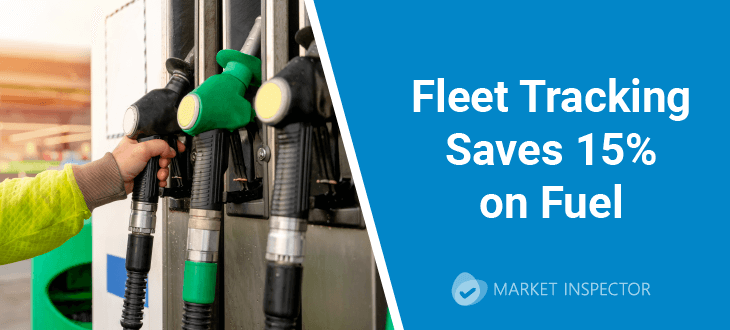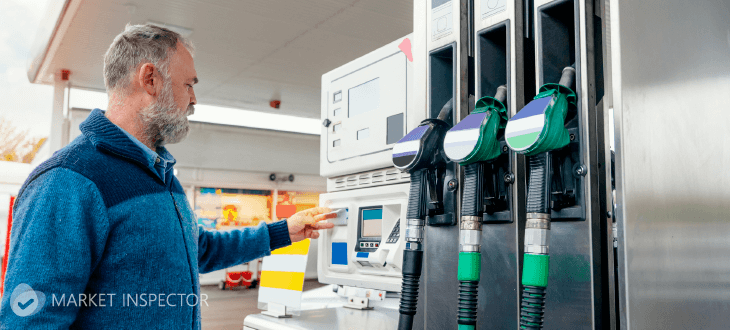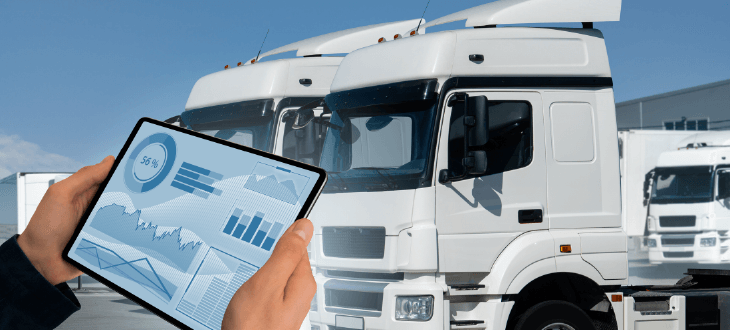Answer these simple questions and we will find you the BEST prices
Which type of solar quotes do you need?
It only takes 30 seconds
100% free with no obligation

Get up to 4 quotes from our selected suppliers by filling in only 1 form

Save money by comparing quotes and choosing the most competitive offer

Our service is 100% free and with no obligation
- Market-Inspector.co.uk
- Vehicle Tracking
- Truck tracking
Explore Truck Tracking for Your Business


- Transportation & logistics is anticipated to register the fastest compound annual growth rate (CAGR) of 18.0% over the forecast period from 2023 to 2030.
- Businesses can minimise their fleet's fuel consumption by approximately 15% through features provided by their tracking system.
- Implementing truck tracking and telematics systems can significantly enhance the accuracy of delivery times for businesses.
In today's competitive business landscape, efficiency and security are paramount for businesses relying on transportation and logistics. Truck tracking technologies enhance these aspects and bring significant cost reductions and operational improvements.
This guide will explore the various benefits and vital features of truck tracking systems, tailored to different business needs, drawing from various industry sources and studies.
For the Telematics Survey 2024, Teletrac Navman surveyed over 500 fleet professionals globally to identify critical aspects of fleet management, such as the integration of telematics and artificial intelligence technologies, which are essential for modern fleet tracking systems.
These technologies aid in addressing sustainability challenges, and improve driver welfare - all key concerns for effective fleet tracking and management.
- Describe your needs
- Get free quotes
- Choose the best offer
It only takes 30 seconds

Why choose truck tracking for your business?
Truck tracking systems are indispensable for a wide range of industries, particularly those reliant on precise logistics and timely deliveries, such as freight, delivery services, and distribution companies.
Additionally, industries like construction, retail, and manufacturing can greatly benefit from real-time fleet monitoring to optimise supply chain operations and delivery times.
According to industry analysis, adopting truck tracking technologies is increasingly becoming a standard practice to tackle rising operational costs and maintain a competitive edge in the market.
A Market Analysis report by Grand View Research highlights that the adoption of vehicle tracking systems is driven by their ability to provide real-time data, which is crucial for businesses aiming to improve route efficiency and reduce operational downtime.
The increasing fleet size and the widespread use of global positioning systems for logistics and transportation tracking worldwide are driving this growth.
According to Grand View Research’s Vehicle Tracking System Market Size, Share & Trends Analysis Report, the transportation and logistics segment is anticipated to register the fastest compound annual growth rate (CAGR) of 18.0% over the forecast period from 2023 to 2030.
This statistic highlights the significant role and growing adoption of commercial vehicle tracking systems in the transportation and logistics industry, emphasising their importance in enhancing fleet management and operational efficiency.
How can your business benefit from truck tracking?
The core benefits of truck tracking technology in fleet management are multifaceted, addressing real-time operational needs, cost efficiency, security, and regulatory compliance, each playing a crucial role in enhancing the logistics and transportation sector.
Let’s take a look at these main advantages in detail below.
Access to real-time data
Real-time tracking stands out as one of the most vital advantages of truck tracking systems. It allows for instantaneous access to vehicle locations, facilitating better fleet coordination and management. This is based on insights from the Market Analysis report by Grand View Research.
This feature ensures that businesses can respond promptly to any situation that may affect delivery times, such as traffic jams, accidents, or vehicle malfunctions.
Moreover, it empowers fleet managers to make informed decisions on the fly, which can enhance customer service by ensuring timely deliveries and swift reaction to any arising issues.
Fuel consumption monitoring

According to insights from Webfleet, a fleet management company, businesses can minimise their fleet's fuel consumption effectively through advanced features provided by their tracking system. This can help reduce fuel consumption by up to 15%.
Connecting to a truck's FMS allows fleet managers to analyse fuel use at the trip level in real-time. This precise monitoring helps identify whether routes are fuel-efficient and detects any unusual fuel losses or theft, facilitating immediate action.
Additionally, a navigation system assists in planning fuel-efficient routes by avoiding congested areas, construction zones, and adverse weather conditions. This helps maintain steady driving speeds and reduces fuel consumption due to stops and starts, contributing to overall fuel efficiency.
By monitoring and training drivers to utilise cruise control effectively, vehicles maintain consistent speeds, which helps reduce unnecessary fuel usage.
Increased security
Continuous monitoring and advanced geofencing technologies protect valuable assets against theft and unauthorised use, significantly lowering potential financial losses and insurance costs.
Reduced operating costs
Optimising routes and reducing idle times through truck tracking systems lead to significant fuel savings and reduced operational expenses.
These systems help businesses minimise unnecessary mileage and improve logistical efficiency, contributing to overall cost-effectiveness.
Vehicle maintenance scheduling

Regular maintenance, as highlighted by Webfleet, ensures that vehicles are running efficiently. Well-maintained trucks use fuel more effectively, which not only reduces consumption but also prevents costly breakdowns and repairs.
Leveraging truck tracking for vehicle maintenance scheduling as highlighted by Teletrac Navman not only optimises fleet operations but also contributes to cost savings, safety, compliance, and overall business health.
Here’s how your business can benefit from truck tracking when it comes to vehicle maintenance scheduling, with insights according to The Telematics Report 2024 by Teletrac Navman.
- Proactive maintenance scheduling: Teletrac Navman highlights the importance of vigilant monitoring of vehicle-specific metrics such as mileage, fuel use, and engine hours for setting accurate maintenance schedules. This proactive approach not only ensures the timely servicing of fleet vehicles but also extends their lifespan and enhances overall ROI by preventing minor issues from becoming major repairs.
- Cost reduction in repairs: According to Teletrac Navman, regular maintenance detected through tracking systems can prevent severe breakdowns, significantly reducing the cost of repairs. Frequent, smaller maintenance tasks like oil changes are considerably less expensive than major repairs such as engine replacements that may become necessary due to neglect.
- Enhanced vehicle uptime: Teletrac Navman points out that scheduled maintenance, facilitated by GPS fleet tracking, minimises unplanned downtime. Keeping vehicles in good working order through regular checks maximises uptime, maintains consistent service delivery, and protects the bottom line against losses from unexpected vehicle failures.
- Improved compliance and safety: Regular maintenance also ensures compliance with safety standards and regulations. Teletrac Navman emphasises that well-maintained vehicles are less likely to incur violations during inspections, which can lead to costly penalties or negative impacts on CSA scores, affecting business opportunities.
The CSA (Compliance, Safety, Accountability) program, designed to identify and mitigate safety issues, is crucial for fleet tracking. It consists of three main components: measurement, evaluation, and intervention.
Measurement uses data from inspections and crashes to assess safety, while evaluation through the Safety Measurement System (SMS) helps determine necessary corrective actions.
Intervention methods range from warning letters to comprehensive investigations, aiming to improve safety practices.
Driver involvement and responsibility
Teletrac Navman advocates for the integration of features like Driver Vehicle Inspection Reports (DVIR) that enable drivers to conduct and report thorough pre-and post-trip inspections.
This practice ensures immediate attention to potential issues, promoting a culture of safety and responsibility among drivers.
Accurate ETAs

Implementing truck tracking and telematics systems can significantly enhance the accuracy of delivery times for businesses. As highlighted by Geotab in their report on small fleet management, these systems enable real-time monitoring and route optimisation.
This not only ensures that customers receive precise ETAs but also helps in effectively managing fleet operations.
Geotab’s research points out that this technology is particularly beneficial in maintaining operational control and optimising route management, thereby directly contributing to improved customer service and satisfaction.
Implementing truck tracking technologies in your fleet can significantly contribute to this aspect of your business in several key ways:
- Real-time location tracking: Truck tracking systems utilise GPS technology to monitor the exact location of vehicles in real time. This allows dispatchers to provide customers with up-to-the-minute ETAs, based on the vehicle's current position and traffic conditions. Accurate location data ensures that customers are informed and can plan accordingly, reducing the chance of missed deliveries or customer dissatisfaction.
- Traffic and route optimisation: Modern truck tracking systems include features that analyse current traffic conditions to recommend the fastest routes. This helps drivers avoid delays caused by traffic jams, road construction, or accidents. By optimising routes, companies can ensure quicker delivery times and more accurate ETAs, leading to improved customer service.
- Improved dispatch efficiency: With access to real-time data on each vehicle's location and status, dispatchers can make informed decisions when assigning new pickups or deliveries. This means that vehicles can be routed more efficiently, reducing wait times for customers and increasing the number of deliveries that can be completed in a day.
- Predictive analytics: Some advanced tracking systems incorporate predictive analytics, using historical data to forecast travel times more accurately under various conditions. This can be particularly useful for planning deliveries during peak traffic hours, on busy days, or through areas prone to delays, helping to set realistic expectations for both customers and management.
- Enhanced communication: Truck tracking systems often come with integrated communication tools that allow for seamless communication between drivers and dispatch. Quick updates on changes in delivery status or immediate notification of any delays help in refining the ETA provided to the customer.
- Accountability and performance monitoring: Tracking solutions not only monitor location but can also record data on driver performance, such as speed and idling times. This information can be used to improve driving behaviours, ensure compliance with scheduled routes, and overall, refine the accuracy of ETAs provided to customers.
Key features of fleet tracking
Investing in the best fleet tracking system in the UK enhances operational efficiency. Fleet tracking technology allows for real-time monitoring of vehicle locations, optimising routes, reducing fuel consumption, and enhancing driver safety.
The Telematics Survey 2024 from Teletrac Navman, provides significant insights into the current state and future trends of fleet management globally, with a focus that can be particularly relevant to UK-based business owners interested in truck tracking and fleet management.
Read on to find out more about key points from the report that emphasise the importance of truck tracking for business owners.
Enhanced operational efficiency

The use of telematics, including GPS tracking, has been shown to provide measurable savings for fleet operators.
Truck tracking allows for real-time monitoring of fuel usage, vehicle locations, and driver behaviour, which can lead to significant reductions in operational costs.
For UK business owners, this means an opportunity to optimise routes and reduce unnecessary expenses.
Improving driver safety and wellbeing
More than half of the survey's respondents noted the negative impact of the cost-of-living crisis on driver mental health.
Telematics solutions help monitor driver behaviour and ensure compliance with driving hours regulations, which can contribute to improved safety and reduced stress for drivers.
This is particularly important in the UK where road safety regulations are stringent.
Support for decarbonisation efforts
As environmental pressures increase, UK fleet operators are transitioning to mixed and alternative fuel vehicles.
Telematics can aid this transition by providing data on vehicle performance and fuel efficiency, helping fleets manage a shift to electric or hybrid vehicles effectively.
Compliance with government mandates
The survey highlights that UK operators expect government mandates for sustainable energy to progress within three years.
Telematics systems can help ensure compliance with these evolving regulations by providing accurate and timely data.
Predictive maintenance and cost reduction
Utilising AI and telematics data, UK business owners can predict vehicle maintenance needs, avoiding costly breakdowns and extending the life of their fleet vehicles.
This proactive approach can lead to considerable savings and improved fleet reliability.
Adaptation to market changes
The report points out that the fleet industry is at a crossroads of innovation, adaptation, and sustainability.
UK business owners can use truck tracking to stay ahead of market changes by leveraging data to make informed decisions about fleet management, staffing, and technology investments.
Incorporating these points, business owners can better understand the strategic benefits of fleet tracking.
These tools not only enhance operational efficiency and compliance but also support broader business goals such as sustainability and driver well-being, which are increasingly important in today’s competitive and regulatory landscape.
Find the right company for your truck tracking system
When selecting a truck tracking system, it's crucial to choose a provider that not only offers a robust platform but also comprehensive support and analytics capabilities.
The return on investment for these systems can be swift, as businesses often report significant reductions in operational costs and a positive ROI within the first year of implementation. Additionally, comparing costs among different providers is essential to ensure you get both the best value and the right features for your needs.
Several fleet telematics companies offer solutions that are tailored to meet the diverse needs of businesses.
Verizon Connect is known for its detailed reporting and comprehensive fleet management solutions. Meanwhile, Webfleet Solutions provides real-time tracking and easy integration with existing systems, while RAM Tracking specialises in enhancing fleet efficiency and security with advanced features.
Selecting the ideal company for your truck tracking system is essential for any UK-based business aiming to enhance fleet efficiency and safety. A reliable provider will equip you with advanced tools to monitor vehicle performance, optimise routes, and manage driver behaviour effectively.
Another critical aspect of utilising a fleet tracking system is the tracker installation process. Professional installation ensures that the trackers are correctly fitted and fully functional, thereby providing reliable data.
Ensuring your fleet operations are streamlined and compliant with the latest regulations is crucial. To make the most informed decision, it's important to compare offerings from multiple providers.
Getting multiple quotes allows you to assess features, pricing, and support options, ensuring you find the best fit for your business needs. Start exploring your options today.
- Describe your needs
- Get free quotes
- Choose the best offer
It only takes 30 seconds

FAQ
Fleet tracking enhances business efficiency and profitability through several key benefits. It reduces operational costs by lowering fuel consumption, maintenance expenses, and unauthorised use, as demonstrated in various studies.
The system also enhances security by enabling real-time vehicle and cargo tracking, minimising theft risks. Compliance with regulatory standards is streamlined, helping avoid fines.
Operational efficiency is improved by optimising routes and schedules, and enhancing customer service. Additionally, fleet tracking aids in achieving sustainability goals by reducing carbon emissions.
To track a commercial truck, businesses use GPS fleet tracking systems that involve installing GPS devices on trucks. These devices send location and other data back to a central server, accessible through software or a web platform.
This setup enables fleet managers to monitor real-time vehicle locations, routes, speeds, and idle times. Successful implementation requires selecting appropriate hardware and software providers, installing the necessary equipment in the vehicles, and training staff to use the tracking software effectively.
Heavy Goods Vehicle (HGV) tracking involves monitoring the movement and logistics of larger vehicles used in freight and distribution. It is crucial for managing heavy transport operations efficiently.
This system enhances operational efficiency, ensures regulatory compliance, and improves safety. It also helps reduce costs and boosts customer satisfaction by offering precise delivery estimates and faster response times in logistics.
A fleet tracker is a device or software that monitors, manages, and maintains the logistical aspects of fleet vehicles to optimise performance and reduce costs.
The data collected is sent in real-time to a fleet management software platform, which analyses vehicle performance, driver behaviour, and operational efficiency.
Fleet trackers are vital for businesses aiming to enhance safety and ensure compliance in their transportation operations.

Nicole Bea Kerr is a content writer for Market Inspector, leveraging her experience in B2B journalism and editing. She is interested in bringing more awareness to sustainability and helping businesses make informed choices through insightful narratives.
We strive to connect our customers with the right product and supplier. Would you like to be part of Market Inspector?

